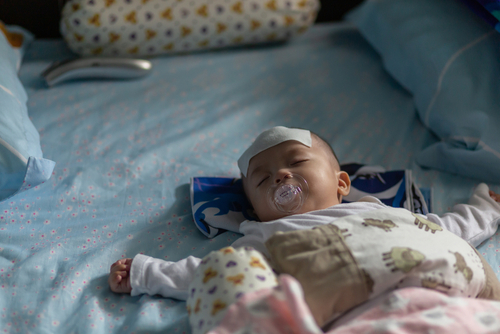
When Do I Need To Call A House Call Doctor?
April 1, 2021
How Do You Fix A Persistent Cough?
May 25, 2021How To Reduce A Baby’s Fever At Night?

How To Reduce A Baby’s Fever At Night? Small children get fevers quite often. However, as a parent, this can be frightening, and the child will be distressed and unable to resettle and sleep.
There are a few things that you can do to reduce child fever, and as long as the fever is not high you don’t need to call the doctor. Make sure that you have a baby thermometer on hand to make an accurate assessment, and this is what to do next.
Reduce Child Fever

A child or baby will have a fever for many reasons, they may be fighting off an infection, or simply teething. Immunity is not fully developed until around 7 years of age so even something as simple as a bad cold can cause a child to have a fever, usually low grade for a day or two.
When the child wakes in the night it is important to keep them hydrated,
Treatment for a Baby Over Three Months Old

- Give Electrolyte replacement fluids (purchase from the chemist).
- If a baby less than 10 months, try to breastfeed to settle and hydrate them. Over 10 months they should tolerate the electrolyte fluids.
- The smaller the child the more at risk they are of dehydration.
- If the baby appears to be in pain and is over three months old you can give a dose of liquid Dymadon with a dropper, instructions are on the bottle, this will lower the fever back to normal. Don’t give medication to bay’s aged less than three-month-old.
- Then give the baby or child a tepid bath to lower body temperature.
- If the fever is higher than 103 degrees call the doctor or take the baby to A&E.
Fluids

Reduce child fever by offering fluids every hour is really important, and the rehydration fluids will help to put the electrolytes back in the system and lower the fever. Make sure that the child gets plenty of rest, and is not wearing heavy clothing.
If the fever is low grade the feeds can be continued as normal.
Teething

Many children and babies will get a fever when teething and it is important to reduce child fever. When you look at a baby, who will probably wake up crying you will notice that the side of their face is red and hot and the pain often travels into the ear area.
Not all babies get these symptoms, but as the tooth breaks through the surface of the gum it can be painful to many. Ask your chemist to suggest a topical application to safely rub on the baby’s gums.
This can often be when you require the Dymadon or similar liquid product approved by your doctor.
Baby’s can’t tell you What is Wrong

Because a baby is too young to communicate if he wakes up crying something is wrong. You have to best work out what the problem is, so take the temperature first, and if it is a low-grade fever you will know what to do to help your child resettle.
If you go to change the nappy and it is not wet, the baby is probably not getting enough fluids and could be dehydrated, so it is important to try to get more fluids into your child. Give fluids every hour until he is passing enough urine again.
If you are worried about urinary output go straight to A&E for assessment.
When a Tiny Baby is Irritable

When a baby is under three months of age and you suspect a fever the temperature is taken rectally with a special thermometer for the purpose.
With such a small baby we don’t take any risks so if the baby has a fever over 102 it is best to seek medical attention, as small babies get dehydrated quickly, and you need to find the source of the problem. A baby this age is too young to be medicated at home.
How To Reduce A Baby’s Fever At Night? – Conclusion

When you are having your first baby, purchase a reputable book that will take you through every stage of child health and illness, as you need to know what to do in different situations. A fever occurs quite often in children, how to reduce child fever will become a useful thing to learn about.




